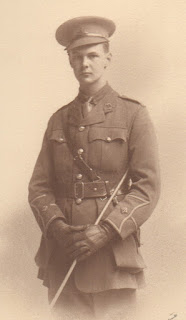Billets at Sarginesco.
There was another sharp frost overnight 18th/19th.
The Battalion, along with the whole of 23rd Division began the march
which would take them to their new destination. Capt. William Norman Town (see 14th
November), recalled
how, “The 23rd Division
began its historic march of 100 miles across the Italian plain. None who took
part in that march will ever forget it”.
Starting at 9.45am the Battalion marched eighteen miles via Grazie,
Mantua and Stradella to the hamlet of Carpaneta, near Gazzo. Passing through
Mantua around lunchtime the Battalion received a memorable welcome, remembered
by Pte. Harold Charnock (see 18th November): “The
inhabitants were most enthusiastic and were particularly astonished at the
smart turnout of the men and the transport, so much that they thought we were
just out from England. We marched down a
narrow lane of people who threw flowers, confetti and apples, at the same time
waving flags and cheering. This was
almost too much for some of the horses”. Capt. Town, with his classical
education, was equally struck by both the city and the reception, “we marched through the streets of historic
Mantua, the home of Virgil, one of the fortresses of the Austrian
Quadrilateral, with its two lakes and encircling River Mincio. We were received as if we had won the war rather
than just arrived. Chrysanthemums,
postcards, cigarettes, etc, were showered upon us; the Italian flag was waved
in the faces of restive horses; vivas resounded and the stimulus to the Italian
morale, which was no doubt one reason for our march, was manifest”.
Pte. John Walter
Gethen (see 5th July),
who had been posted to 69th Trench Mortar Battery, was charged with
being drunk and ‘resisting the Military Police’; he was ordered to undergo 21
days’ Field Punishment no.1. He had a long string of previous offences.
The Supplement to the
London Gazette formally published notice of the gallantry awards made to
three members of the Battalion for their actions on 20th September.
Maj. Edward Borrow (see 12th November) was
awarded the Distinguished Service Order; Capt. John Edward Lennard Payne (see
16th November) received the Military Cross; and CSM Charles Edward Parker, MM (see 29th October) the
Distinguished Conduct Medal.
Pte. James Wilson
(see 9th October), serving
as a lorry driver with the Motor Transport Section of the ASC, disembarked in
Dar es Salam.
Sgt. Herbert Lawton (see 28th April), serving with 3DWR at North
Shields, was transferred to 86th Training Reserve Battalion.
Sgt. Ronald Jeckell
(see 12th August), who had
been in England since having been wounded in July, was discharged from hospital
and posted to Northern Command Depot at Ripon.
L.Cpl. Charles Graham
(see 21st June), who had been
in England since having had his right foot amputated as a result of wounds
suffered while serving with 10DWR in July 1916, was transferred from Keighley
War Hospital to the Pavilion Military Hospital in Brighton.
Pte. Robert Wilson
Irving (see 24th June),
serving with 360th Labour Company, Labour Corps, appeared before an
Army Medical Board in Nottingham. The Board found him unfit for further
military service and recommended that he be discharged.
Pte. Louis Heren
(see 27th October) was
formally discharged from the Army as permanently unfit for further service,
having lost both eyes when wounded on 20th September. He remained at
St. Dunstan’s Hospital for further treatment.
Pte. Walter Lee (see
15th March), who had been transferred to the Army Reserve Class
W in March and had resumed his pre-war employment as a core maker for Messrs.
Joseph Blakeborough & Sons, Woodhouse Works, Brighouse, was formally
discharged from the Army as no longer physically fit for service on account of
his wounds. He was awarded an Army pension of 5s. 3d. per week for four months,
increasing thereafter to 5s. 6d. per week.
Pte. Arthur Nicholl (see 7th June),
who had been in England since having been wounded in June, was formally
discharged from the Army as no longer physically fit for service on account of
his wounds; he would be awarded the Silver War Badge and an Army pension.
At home in Malton, Mary Jane Johnson, wife of Pte. Lancelot Johnson (see 22nd March), gave birth to the couple’s third child;
the baby boy would be named Francis Victor.
At home in Maidstone, Kent, Jessie Wood, wife of L.Cpl. Joseph Simpson (see 14th July), serving in England with 493rd
(Home Service) Employment Company, gave birth to the couple’s first child, a
daughter who would be named Betty.
A pension award was made in the case of the late Pte. William Ackroyd (see 12th September), who had been killed in action on 1st
May while serving in France with 2DWR; his widow, Edith, was awarded £1 8s. 9d.
per week for herself and her four children.
A payment of £6 12s. was authorised, being the amount due in
pay and allowances to the late Pte. George
Holmes (15231) (see 8th June),
who had died of wounds on 8th June; the payment would go to his sister
and sole legatee, Elizabeth Williams.
A payment of 12s. was authorised, being the amount due in
pay and allowances to the late Pte. George
Waterworth (see 7th June),
who had been killed in action on 7th June; the payment would
go to his father, James.









